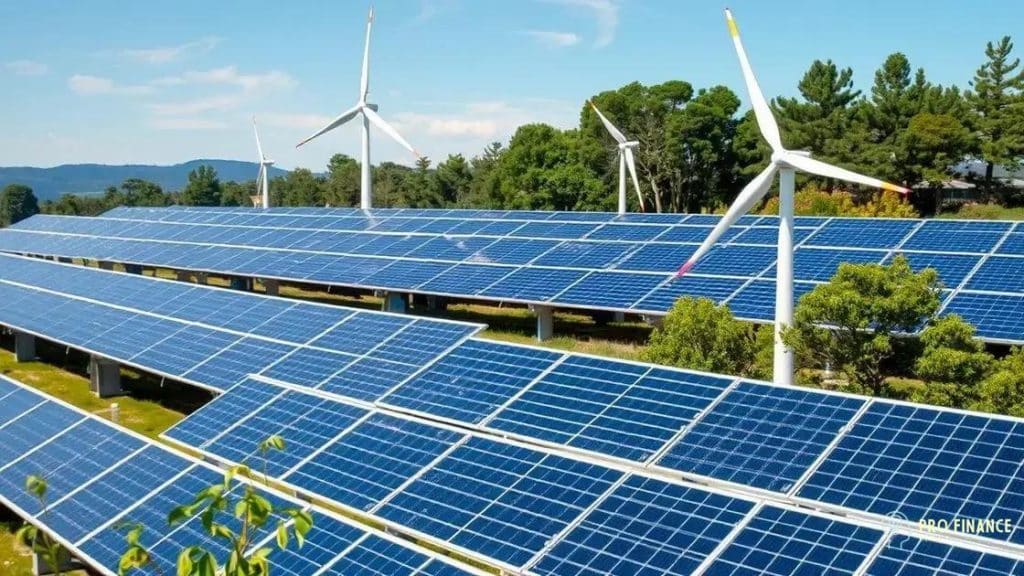Innovations in renewable energy technology using AI

Integrating AI with renewable energy technologies enhances efficiency in energy generation, storage, and consumption, paving the way for a more sustainable and decentralized energy future.
Innovations in renewable energy technology using AI are reshaping the landscape of clean energy. As we navigate the challenges of climate change, AI emerges as a powerful ally in developing more efficient solutions. Have you ever wondered how these technologies impact our daily lives?
The current state of renewable energy technology
The current state of renewable energy technology is evolving rapidly, driven by innovation and the urgent need to combat climate change. With the use of advanced technologies, we’re observing significant advancements that enhance energy production and efficiency.
Recent Developments in Solar Energy
One of the major milestones in renewable energy is in solar energy. Cutting-edge technologies, such as bifacial solar panels and solar tracking systems, have improved energy capture remarkably. These innovations allow solar panels to harness sunlight from both sides, yielding more electricity than traditional panels.
- Bifacial solar panels can capture reflected sunlight.
- Solar tracking systems adjust panels to follow the sun.
- Improvements in photovoltaic efficiency lead to higher energy output.
In addition, research into organic photovoltaics is paving the way for flexible solar cells, which can be applied to more surfaces, expanding their applicability in everyday life.
Advancements in Wind Energy Technology
Wind energy has also seen tremendous growth. Modern turbines are not only larger but also more efficient. These innovations minimize their environmental footprint while maximizing energy generation.
The integration of AI in the management of wind energy systems can optimize energy output by predicting wind patterns and adjusting turbine operations in real-time. This ensures energy creation is both efficient and sustainable.
- Modern wind turbines are designed with aerodynamic advancements.
- AI enhances predictive maintenance for wind farms.
- Smart grid technologies improve overall energy distribution.
Moreover, offshore wind farms are becoming increasingly popular, generating larger amounts of energy while utilizing vast ocean spaces.
As we look towards the future, the collaboration of different technologies, like battery storage and AI, will lead to smarter energy solutions. This promise of renewable energy technology is bright, as it plays a crucial role in global sustainability efforts.
AI applications in solar energy advancements

AI applications in solar energy advancements are revolutionizing how we harness sunlight. By analyzing vast amounts of data, AI can optimize solar panel performance and predict energy output effectively.
Enhancing Solar Panel Efficiency
One significant application of AI is in maximizing the efficiency of solar panels. Intelligent algorithms analyze weather patterns, solar radiation, and historical performance data to adjust angles and orientation for optimal light capture.
- Machine learning algorithms predict ideal angles for solar panels based on real-time weather data.
- Performance analytics identify underperforming panels that may require maintenance.
- AI systems can recommend optimal times for energy storage and usage based on predicted solar yield.
These technologies are not only increasing energy output but also decreasing maintenance costs, making solar energy more accessible.
Smart Inverters and Predictive Maintenance
Another promising development is in smart inverters. These devices leverage AI to manage electricity flow from solar panels to the grid. Smart inverters can analyze energy demand and adjust output instantly, improving overall system reliability.
Moreover, AI helps in predictive maintenance, allowing solar companies to anticipate failures before they happen. This proactive approach ensures that systems remain efficient and operational, reducing downtime significantly.
Continued integration of artificial intelligence in solar technology promises a sustainable future. From improving renewable energy cycles to enhancing grid stability, AI is becoming a vital component in the journey toward a greener planet.
Harnessing wind energy through smart algorithms
Harnessing wind energy through smart algorithms is transforming the renewable energy landscape. As wind power becomes a prominent energy source, advanced technology plays a critical role in maximizing its efficiency.
Optimizing Wind Turbine Performance
Smart algorithms analyze data from wind turbines to optimize their performance. These systems monitor real-time factors such as wind speed, direction, and temperature. By doing so, they can adjust turbine settings instantly to generate the most energy.
- Data analytics helps in predicting wind patterns accurately.
- Algorithms can calculate the best angles for blade positioning.
- Predictive maintenance identifies issues before they cause downtime.
This combination not only increases energy output but also extends the lifespan of the turbines.
Integrating AI in Wind Farm Management
The integration of AI into wind farm management enhances overall efficiency. AI systems can coordinate multiple turbines within a wind farm, ensuring they work together harmoniously. By managing energy distribution effectively, AI can improve grid stability.
Artificial intelligence helps operators to make strategic decisions based on energy demand forecasts. With this information, they can decide when to release more energy to the grid or store it for later use. This ensures that the energy generated is always used efficiently.
Incorporating smart algorithms into wind energy systems represents a significant step forward. This presents us with a unique opportunity to contribute to a more sustainable future. As technology continues to evolve, the potential for wind energy will only expand, leading us towards cleaner energy practices.
Integrating AI with energy storage solutions

Integrating AI with energy storage solutions is a game changer in the renewable energy sector. As demand for reliable and efficient energy grows, AI helps optimize how we store and use energy.
Smart Energy Management Systems
One way AI enhances energy storage is through smart energy management systems. These systems analyze data from various sources, such as weather forecasts and energy consumption patterns, to manage the discharge and charge cycles of batteries efficiently. By predicting the best times to store or use energy, these systems help reduce energy costs.
- Real-time analytics optimize charging schedules based on energy demand.
- AI algorithms can forecast peak usage times, allowing for better planning.
- Efficient battery management extends the life of energy storage systems.
With these features, businesses and homes can save money while ensuring they have access to energy when needed.
Enhancing Battery Technology with AI
AI also plays a crucial role in advancing battery technology. Machine learning models analyze performance data from various battery types to improve their efficiency and lifespan. This research leads to the development of batteries that charge faster and hold more energy.
The collaboration between AI and battery technology paves the way for innovations that can revolutionize how we use renewable energy. For example, AI can assist in developing solid-state batteries, which promise higher energy densities and greater safety than traditional lithium-ion batteries.
Integrating AI with energy storage solutions showcases a forward-thinking approach to sustainability. As we continue to explore these technologies, the potential for energy efficiency and reliability grows, making renewable energy sources more viable for everyday use.
Future trends in intelligent renewable energy systems
Future trends in intelligent renewable energy systems are shaping how we will generate, store, and consume energy. As technology advances, we can expect significant changes that enhance our efforts towards sustainability.
Decentralized Energy Generation
One major trend is the move towards decentralized energy generation. This means that instead of relying solely on large power plants, individuals and communities can generate their own energy using solar panels and wind turbines on their properties. With intelligent systems, excess energy can be shared within local networks, creating a more resilient power supply.
- Homeowners can use smart meters to track and manage their energy usage.
- Community solar projects allow multiple houses to benefit from shared solar installations.
- Blockchain technology can facilitate energy trading among neighbors.
This trend empowers consumers while reducing strain on centralized grids.
Integration of AI and Machine Learning
AI and machine learning will play crucial roles in optimizing energy systems. By analyzing historical data and predicting future trends, these technologies can enhance energy efficiency and reliability. For instance, AI can optimize energy storage solutions by predicting when energy will be in demand.
These smart systems adjust energy output based on real-time conditions, ensuring that we make the most of renewable resources. They also help in identifying trends in energy consumption, allowing for better planning and infrastructure development.
As we look ahead, innovations like smart grids and energy management systems will revolutionize how we think about and use energy. The integration of artificial intelligence with renewable energy systems will not just improve efficiency but also provide solutions to complex energy challenges.
In conclusion, the integration of AI with renewable energy technologies is paving the way for a more sustainable future. As smart systems evolve, we can expect significant advancements in energy production, storage, and consumption. Embracing decentralization, optimizing energy management, and improving battery technologies will enhance our ability to rely on clean energy sources. Each of these innovations contributes to a greener planet, encouraging individuals and communities to participate in this vital transition. By harnessing the full potential of intelligent systems, we can build a better energy landscape for future generations.
FAQ – Frequently Asked Questions about Intelligent Renewable Energy Systems
How does AI improve energy storage systems?
AI enhances energy storage by optimizing charging cycles and predicting peak usage times, increasing efficiency and reducing costs.
What is decentralized energy generation?
Decentralized energy generation allows individuals and communities to produce their own renewable energy, reducing reliance on centralized power grids.
What role does machine learning play in renewable energy?
Machine learning analyzes data to forecast energy demand and optimize energy usage, contributing to more efficient renewable energy systems.
What are the benefits of smart grids?
Smart grids improve energy distribution and management, allowing for better integration of renewable sources and enhancing grid reliability.





